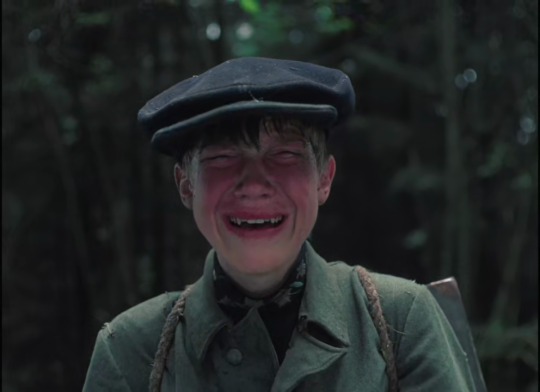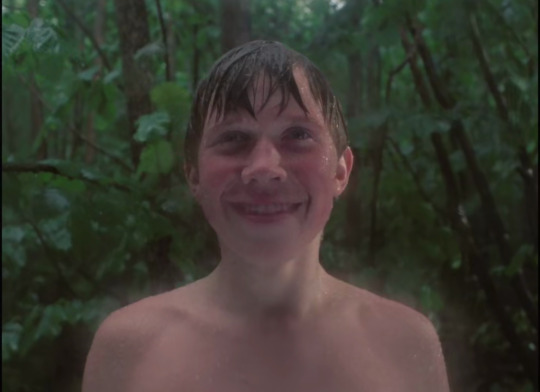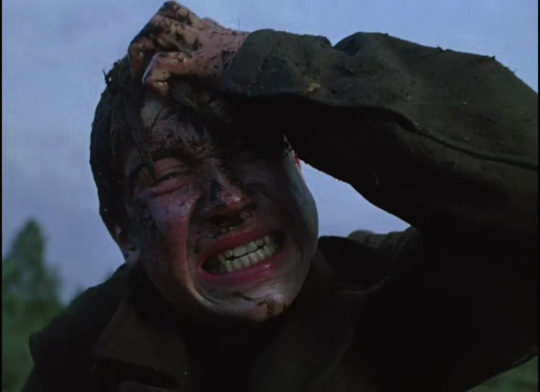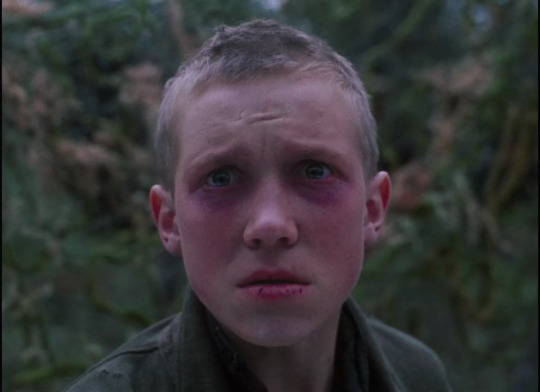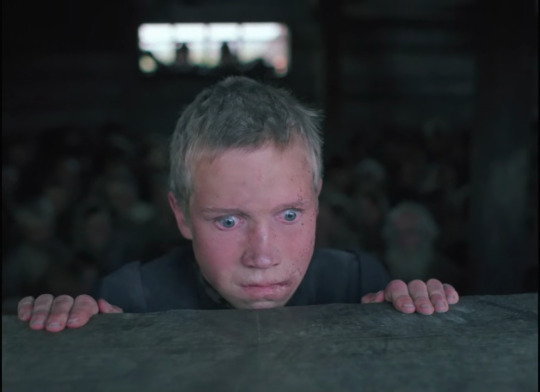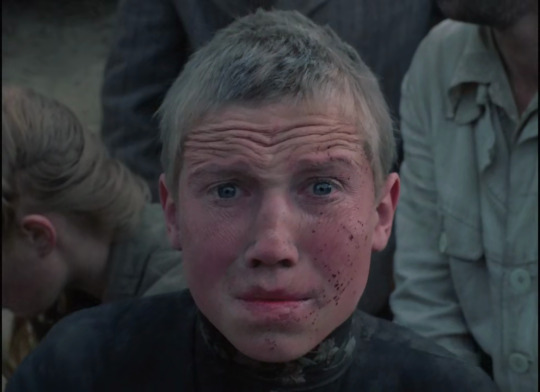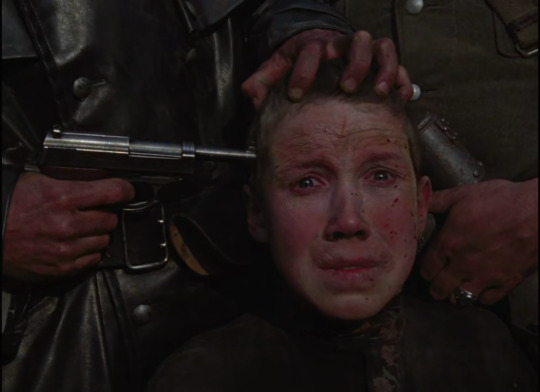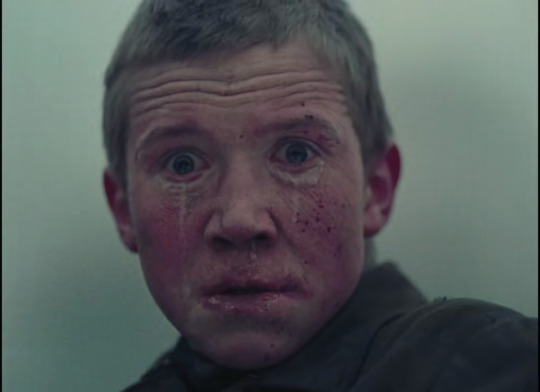#aleksey kravchenko
Text
Come and See / Idi i smotri
(1985, dir. Elem Klimov)

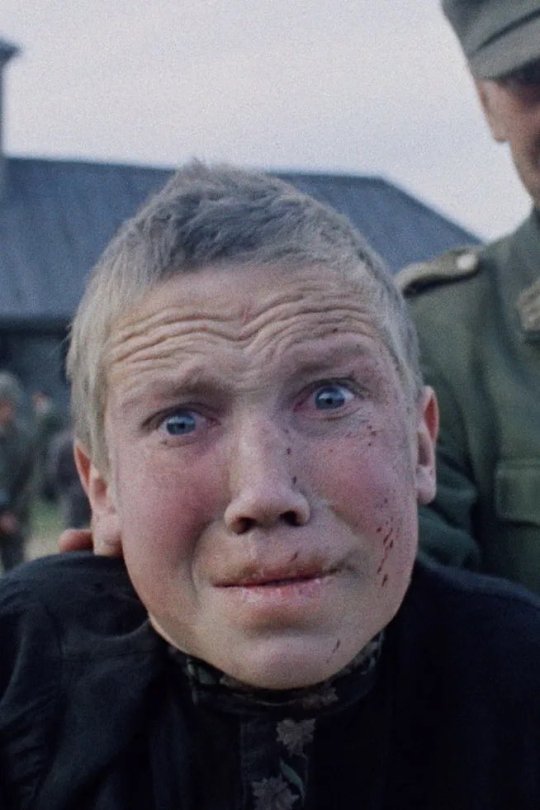
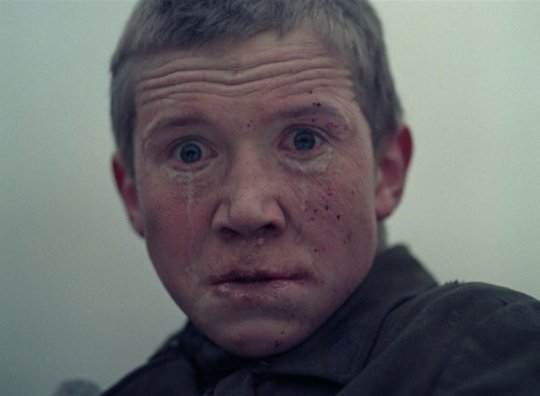
#Come and See#idi i smotri#Elem Klimov#Aleksey Rodionov#Aleksey Kravchenko#WW2#war#drama#masterpiece#perfect#movie#80s#1985#cinema
3 notes
·
View notes
Photo

Come and See
directed by Elem Klimov, 1985
10 notes
·
View notes
Photo
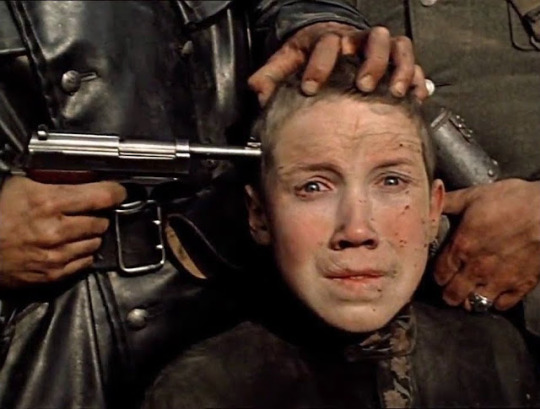
Aleksey Kravchenko in Come and See (Elem Klimov, 1985)
Cast: Aleksey Kravchenko, Olga Mironova, Ljubomiras Laucevicius, Vladas Bagdonas, Jüri Lumiste, Viktors Lorencs, Evgeniy Tilicheev. Screenplay: Ales Adamovich, Elem Klimov. Cinematography: Aleksey Rodionov. Production design: Viktor Petrov. Film editing: Valeriya Belova. Music: Oleg Yanchenko.
Elem Klimov's hard and harrowing Come and See runs a risk that it almost doesn't avoid: Parts of it are filled with such sustained horror and tension that a viewer can grow almost numb and dismissive. It elicits the response: "It's only a movie. These are actors." But such actors, especially Aleksey Kravchenko, then only 14 and picked by the director precisely for his lack of acting experience, even though Klimov was concerned that putting him through what the character must undergo in the film might be damaging to his mental health. (Kravchenko apparently survived intact, and went on to study acting and to build a steady career in film and television.) It's perhaps worth comparing the intensity of Klimov's film to that of Larisa Shepitko's The Ascent (1977), which put its actors through real hardships to create its portrait of life during wartime. Shepitko, married to Klimov, died in an automobile accident in 1979, and her film almost seems like a challenge to her husband to match or excel. In fact, Come and See seems to have exhausted Klimov as a filmmaker: He didn't make another film for the remainder of his life; he died at 70 in 2003. As harsh as the realism of Come and See is, it also has poetic touches in its cinematography and use of landscape, reminding me of another film about a war-torn boyhood, Andrei Tarkovsky's Ivan's Childhood (1966).
2 notes
·
View notes
Text

#movies#polls#come and see#elem klimov#80s movies#aleksei kravchenko#olga mironova#have you seen this movie poll
133 notes
·
View notes
Photo

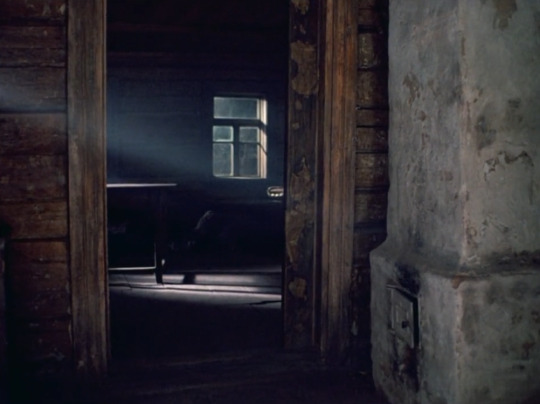
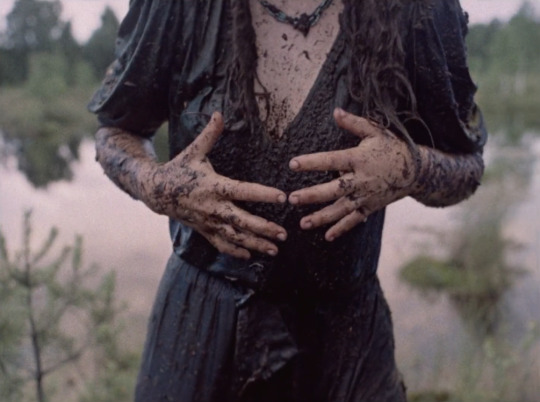

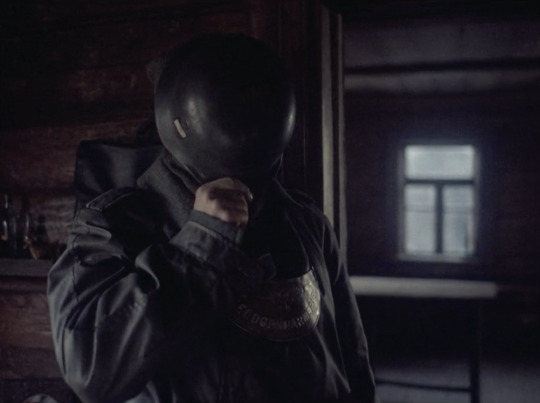

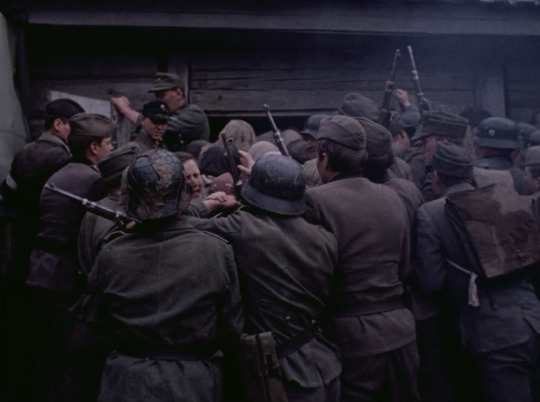


Come and See (1985) dir. Elem Klimov
#come and see#Иди и смотри#idi i smotri#Ідзі і глядзі#idzi i hliadzi#elem klimov#aleksei kravchenko#olga mironova#antiwar#war movies#war films#war history#soviet#soviet union#soviet history#ww2#wwii#ww2 movies#ww2 films#wwii movies#wwii films#screencaps#my caps#caps#russian movies#russian films#russian cinema#soviet movies#come and see 1985
673 notes
·
View notes
Photo

Aleksey Ilych Kravchenko (1889-1940, Russian) ~ Roses in a Black Vase, 1916
#aleksey ilych kravchenko#alexei ilych kravchenko#russian art#still life#still life with roses#red roses
338 notes
·
View notes
Text
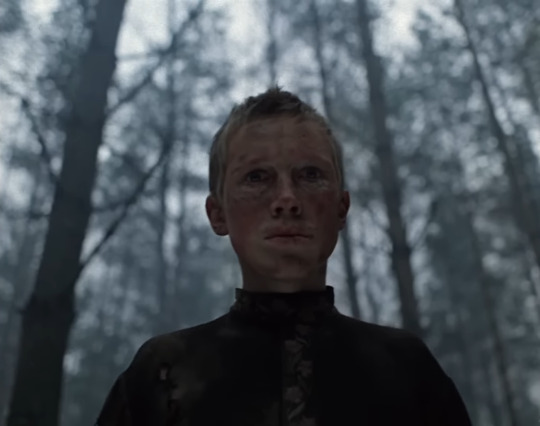
Иди и смотри (Come and See) - Elem Klimov, 1985
36 notes
·
View notes
Photo

Idi i smotri (1985)
#1980s#actor aleksey kravchenko#dir elem klimov#dp aleksey rodionov#cat melodrama#cat war#cat thriller#russian#soviet#belarusian#white#blue eyes#tears#dirt#blood#collar#child#snot#sfx makeup#idi i smotri#come and see#idi i smotri 1985#come and see 1985#kill hitler
18 notes
·
View notes
Text
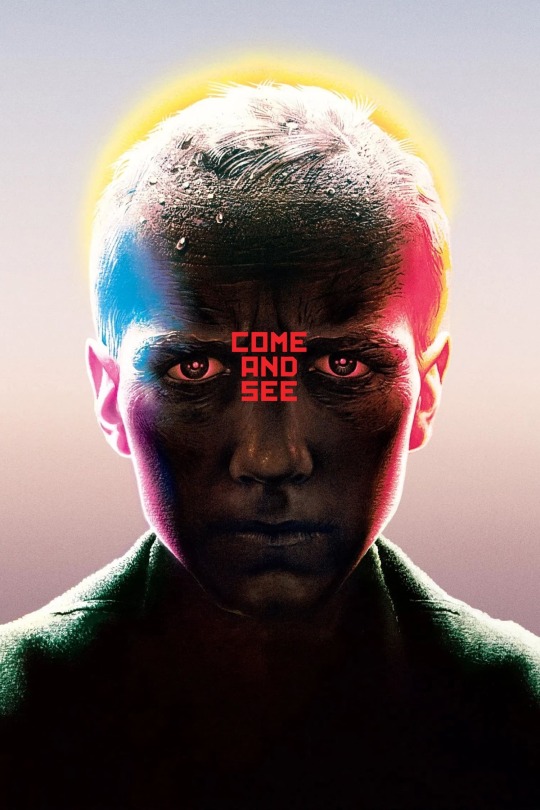
2 notes
·
View notes
Text
On September 8, 1986, Come and See was screened at the Toronto International Film Festival.

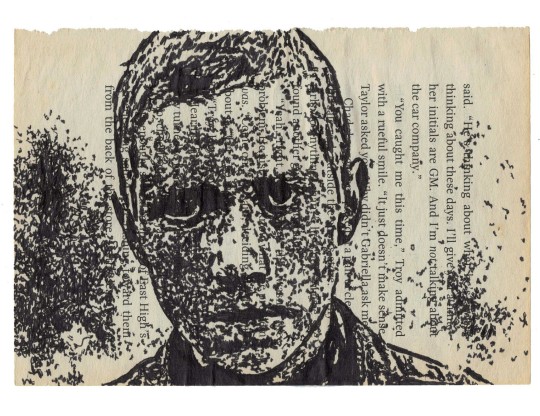
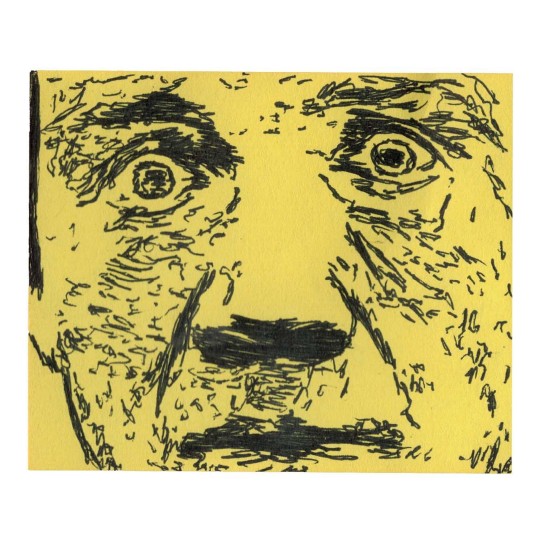

#come and see#elem klimov#aleksei kravchenko#war film#soviet film#anti war film#1980s#art house#avant garde film#art film#classic cinema#classic film#movie art#art#drawing#movie history#pop art#modern art#pop surrealism#cult movies#portrait#cult film
2 notes
·
View notes
Text
The Painted Bird (2019)
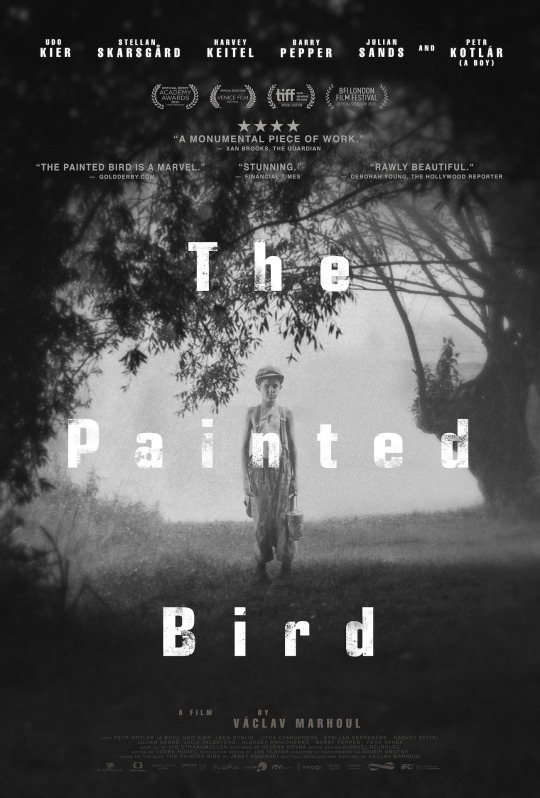
Movie #1,078 • TWO FOR TUESDAY
The Painted Bird begins like this…

…and then proceeds to torture that child in pretty much every way you could imagine (psychologically, physically, and everything in between) for the better part of three hours. It is the ALL GAS NO BREAKS of films about the atrocities mankind unloads on one another. The main and perhaps only complaint I've seen levied against this boils down to just that: this is human suffering porn and human suffering porn sucks. I actually saw that phrase ("human suffering porn") used and it struck me (there's no shortage of shitty takes on this btw). That writer clearly had to make a distinction between this wonderfully shot black-and-white epic and something like Saw VI. To say, "I get that this Art, and I see how it checks off the boxes which makes something Art, but my mind can't parse any contrast between Jigsaw and Udo Kier." You can't really have it both ways, though.
Where torture porn exists purely in service of delivering those salacious goods, this strives to use those elements in service of delivering a message. Like any good war movie, this is stridently anti-war. And like the best war movies, it isn't political in the slightest. The Czech writer-director, Václav Marhoul, went as far as to use the Interslavic language (an auxiliary dialect used to facilitate communication between speakers of various Slavic languages) in order to obscure the actual location of these various Eastern Europe settings. One whiny critic actually wrote that "none of the film takes place in Germany [and] very little of the evil done to the kid has anything to do with Germans or Nazis." Like we needed to cut to a shot of Hitler pouting to understand why these people were living this way.
This movie is based on a 1965 book with a complex and fascinating backstory (its author is Jerzy Kosiński, who also penned Being There). It's pure fiction but what we know about the hell that was WWII suggests that all the gruesome elements aren't altogether fantastical. The parallels/similarities to the all-time classic Come and See (1985), at least on the surface, are instant and unmistakable even if they're not much more than "war seen through the eyes of a young boy." (Interestingly enough, Alexsey Kravchenko — who portrayed the boy in Come and See — plays a Russian military officer here, and one of the few "good guys" in The Painted Bird.) I don't think this is quite on par with Klimov's generational effort, but I'd still say it's a must-watch. As it turns out, this is simply a premium delivery system for the anti-war system.
For me, a grizzled vet of fucked-up horror, the worst moments weren't the violent and sicko outbursts, like when Udo Kier gouges a man's eyes out with a spoon. It was seeing the young boy striving to stay connected to some semblance of humanity in the wake of such things, like when he futilely delivers said eyeballs back to the man crying in the woods.
It was a fascinating choice to cast name actors, from all over the world, in small but important supporting roles in these various vignettes (the film is separated into seven specific chapters that could easily be viewed as shorts in their own right). Stellan Skarsgård doesn't utter a single line of dialogue and Barry Pepper, just one or two. There's the aforementioned Kier, and Harvey Keitel plays a priest. The late Julian Sands is a pedophile who gets eaten alive by rats. Like using the Impact font on the movie poster and inter-titles, this decision left me scratching my head, though not in a bad way.
But in the end this is child actor Petr Kotlár's movie. To subject someone as young as that to what we ultimately find onscreen isn't without a degree of moral ambiguity. That two stand-ins get a special shout-out in the credits alleviates some of this grief/guilt, but it's still worth mentioning. While I believe this is a much more valid complaint than simply stating you (an adult) were personally offended by the content, I choose to see this through a lens of bravery. He's really great in this without every speaking a word. I hope it doesn't/didn't fuck his life up.
I don't think this movie is begging you to look away. I think it's trying to make you look harder at what and why this could happen. Yes, all those Nazis we don't actually see, among many other things. It doesn't spell it out and never offers a concrete answer. The chief film critic of Variety walked out of this and in his "review" he willfully offers up a list of all the other films he's walked out of, among them:
I couldn’t get past the opening credits sequence of “Guardians of the Galaxy Vol. 2” (which had already managed to cutesify my favorite song, “Brandy” by Looking Glass), as Baby Groot dances to ELO’s “Mr. Blue Sky” while the ensemble fights a space alien in the background. I’d enjoyed the original, but the Guardians had clearly gotten too cool to care, so why should I?
Everyone's hell is vastly different in the end. My 2¢? Let's try to relate, even when that seems so painful that it's impossible. For example, I would have walked out of Guardians of the Galaxy Vol. 2 also.
SCORE: ⭐️⭐️⭐️⭐️⭐️⭐️⭐️⭐️⭐️
#two for tuesday#war#2019#9#🇨🇿#václav marhoul director#petr kotlár#nina šunevič#stellan skarsgård#udo kier#harvey keitel#jitka čvančarová#julian sands#ala sakalova#aleksei kravchenko#barry pepper
1 note
·
View note
Text
Every time I see people highly praising the film "Come and See" as an anti-war masterpiece, I can't help but recall that its lead actor Aleksei Kravchenko enthusiastically supports russia's annexation of Crimea and has actively taken part in russian militaristic propaganda, including a movie filmed in the occupied Crimea that depicts Wagner mercenaries as heroes. The movie was co-sponsored by Prigozhin himself. (Wikipedia link for the movie, in russian).
That anti-war masterpiece movie means nothing to its own lead actor. Probably did mean a lot to its (Belarusian) writer, who had been an anti-Nazi resistance fighter during WW2 and wrote a lot of it from his own experience. But the lead actor's stance makes everything ring hollow still...
Just a short summary of russian art, I suppose.
45 notes
·
View notes
Video
youtube
Come and See is a 1985 Soviet anti-war film directed by Elem Klimov and starring Aleksei Kravchenko and Olga Mironova. Its screenplay is based on the 1971 novel "Khatyn" and the 1977 memoir I Am from the Fiery Village. Klimov had to fight eight years of censorship from the Soviet authorities before he could be allowed to produce the film in its entirety.
The film's plot focuses on the Nazi German occupation of Belarus, and the events as witnessed by a young Belarusian partisan teenager named Flyora, who—against his mother's wishes—joins the Belarusian resistance movement, and thereafter depicts the Nazi atrocities and human suffering inflicted upon the Eastern European villages' populace. The film mixes hyper-realism with an underlying surrealism, and philosophical existentialism with poetical, psychological, political and apocalyptic themes.
english subtitles.
90 notes
·
View notes
Text
"Come And See" defined in two words: nightmare fuel.
Director Elem Klimov planned to have lead actor Aleksey Kravchenko hypnotized by a psychotherapist during the most disturbing and violent scenes so that it wouldn't affect his young mind (14 years old at the start of production). However, he turned out not to be susceptible to hypnosis and ended up with psychological trauma.
"Come And See" (1985) Dir. Elem Klimov.
19 notes
·
View notes
Text

Aleksey Ilych Kravchenko (1889-1940, Russian) ~ Roses in a Black Vase, 1916.
7 notes
·
View notes
